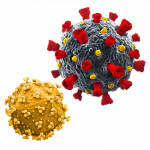While people living with HIV have smaller brain volume as well as poorer scores on neuropsychological tests compared with their HIV-negative peers, such a gap does not widen over time if the virus is well treated with antiretrovirals (ARVs), Reuters Health reports. Consequently, researchers believe that early treatment of HIV may help arrest the virus’s early attack on the brain, which itself may set the stage for cognitive decline.
Publishing their findings in JAMA Neurology, researchers conducted a study of 48 people with HIV and 31 HIV-negative individuals who underwent structural MRIs and neuropsychological tests over about a two-year period. All the HIV-positive participants were on stable ARVs and had an undetectable viral load at the study’s outset and the follow-up visit.
After adjusting the data for age, sex and educational level, the study authors found that at the beginning of the study, the participants living with HIV had poorer scores on six out of eight standard neuropsychological tests.
Both groups of participants had few changes in their test scores by the end of the study, shifts that were similar between the groups.
Upon entering the study, the HIV-positive individuals had smaller cortical thickness and subcortical volumes in their brains compared with the HIV-negative participants. With passing time, however, changes in brain volume charted a similar path between the two study groups.
Having a lower CD4 nadir (the lowest-ever CD4 count) was associated with reduced volumes of white matter in the brain as well as smaller volumes in various brain regions.







Comments
Comments